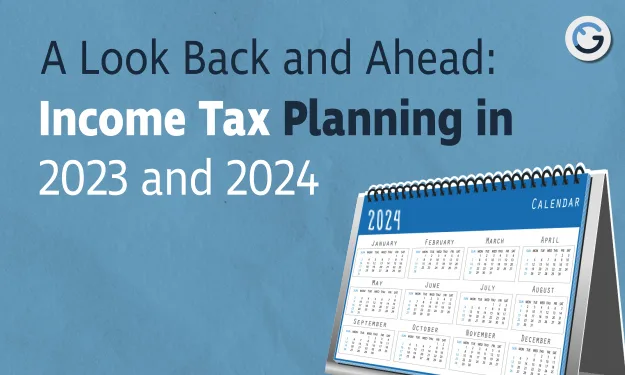It’s That Time of the Year Again!
Where we highlight the tax implications of the year and give you a sneak peek of the tax regime in 2024. Read below for all the recap and wayforward for all things tax!
Significant Changes in Direct Taxation
Individuals classified as ‘Resident but not ordinary resident’ now fall within the tax purview if they receive consideration surpassing ₹50,000 without any charge.
Life Insurance Payouts
Income tax will be levied on funds received from life insurance policies with annual premiums surpassing ₹5 lakhs. This rule is applicable to both individual policies and the aggregate premiums exceeding ₹5 lakhs across multiple policies owned by the same individual.
However, amounts received upon the demise of the policyholder remain exempt from taxation.
Taxation for News Agencies
Commencing from the fiscal year 2023-2024, news agencies established in India exclusively for news collection and distribution will be subject to taxation.
This implies that these agencies are now required to file income tax returns and settle taxes on their profit.
SEZ Units’ Tax Break
While the tax holiday for Special Economic Zone (SEZ) units remains, the eligibility criteria have become more stringent.
To qualify for the tax holiday, SEZ units must repatriate their export earnings to India in convertible foreign exchange within 6 months of the fiscal year-end. Alternatively, they can seek an extension for this deadline from the Reserve Bank of India.
Latest Tax Framework
Implemented a few years back, the new tax framework has now become the default choice for all taxpayers, encompassing individuals, Hindu Undivided Families (HUFs), and Association of Persons (AOPs).
The new system also features revised slab rates, offering lower tax rates and a heightened basic exemption limit of ₹3 lakh.
Expanded Tax Rebate Ceiling: Under the new regime, the tax rebate limit has been raised to Rs. 7 lakhs, providing complete relief from tax obligations. This results in immediate financial assistance and increased disposable income for a significant portion of the population.
Standard Deduction: The new regime now incorporates a ₹50,000 standard deduction, effectively elevating your tax-free income to Rs. 7.5 lakh.
Family Pension: Under the new framework, a standard deduction of Rs. 15,000 or 1/3rd of the family pension, whichever is lower, is provided.
Surcharge Rationalization: High earners (above Rs. 5 crores) will experience a reduced surcharge rate of 25%, down from the previous 37%, resulting in a lower effective tax rate of 39%.
Default Tax Regime: While the new regime serves as the default, taxpayers (excluding those with business/professional income) retain the flexibility to choose the tax regime that aligns best with their financial circumstances.
Presumptive Taxation
The eligibility criteria for presumptive taxation benefits have been adjusted, allowing for an increased threshold, provided that cash receipts remain within 5% of the total receipts during the year:
Businesses: Raised from ₹2 Crore to ₹3 Crore.
Professionals: Increased from ₹50 lakh to ₹75 lakh.
Online Gaming: Taxation applies only to the net winnings from online gaming, taxed at a rate of 30%.
80G Donations: Contributions made to the following Funds will no longer qualify for deductions:
- Jawaharlal Nehru Memorial Fund
- Indira Gandhi Memorial Trust
- Rajiv Gandhi Foundation
Prospects for 2024
As we look towards 2024, the tax landscape seems positioned for further reforms and increased adaptability. The Finance Minister’s commitment to reducing compliance complexities and nurturing a favorable business environment sets the stage for forthcoming developments.
In summary, the fiscal year 2023 witnessed a blend of continuity in established schemes and targeted amendments reflecting the evolving economic landscape. The outlook for 2024 holds the potential for a more streamlined tax regime, simplified capital gains, and augmented deduction limits for 80C and 80D to account for inflation. Navigating these changes underscores the importance of informed decision-making and strategic financial planning.

